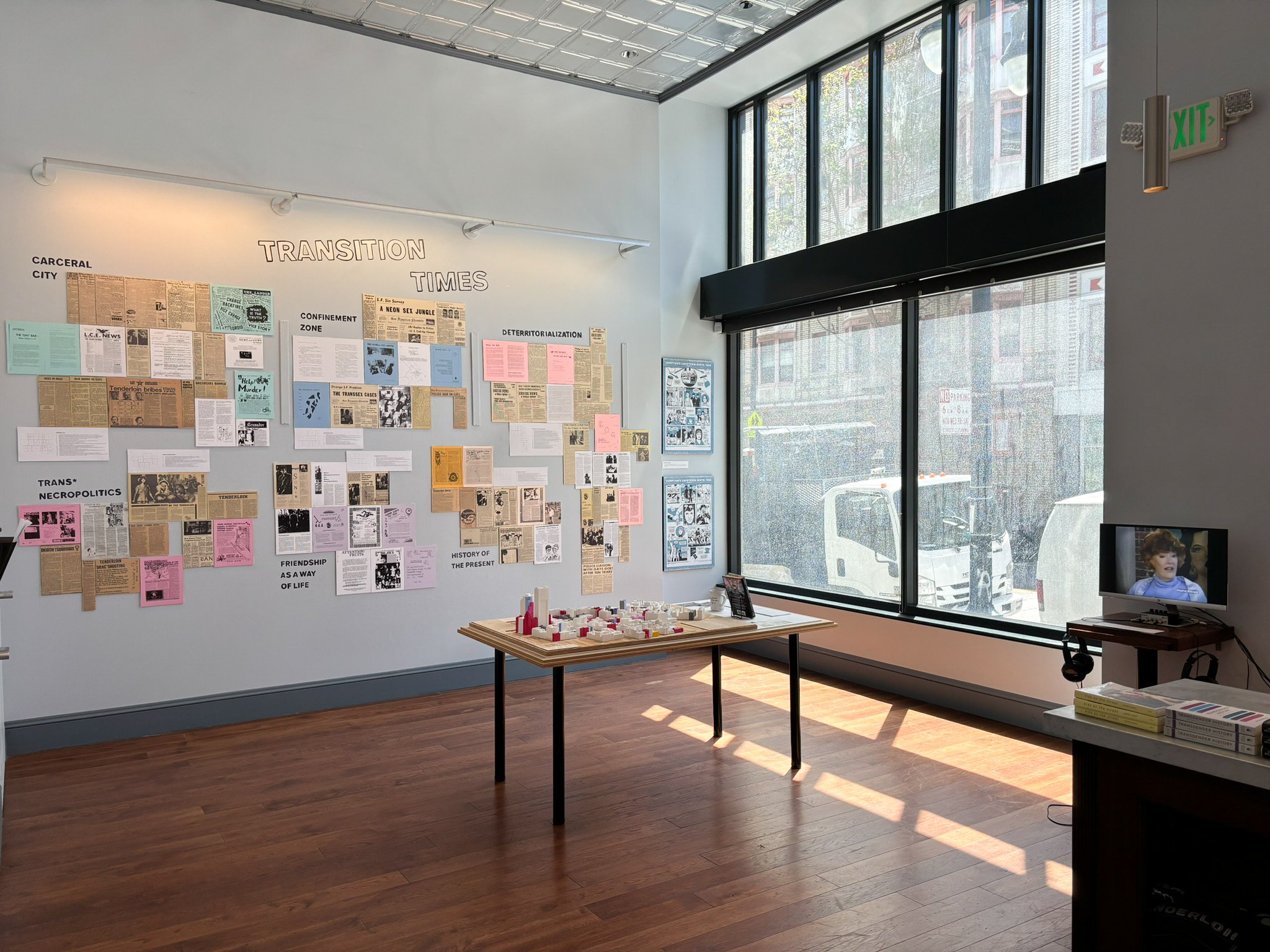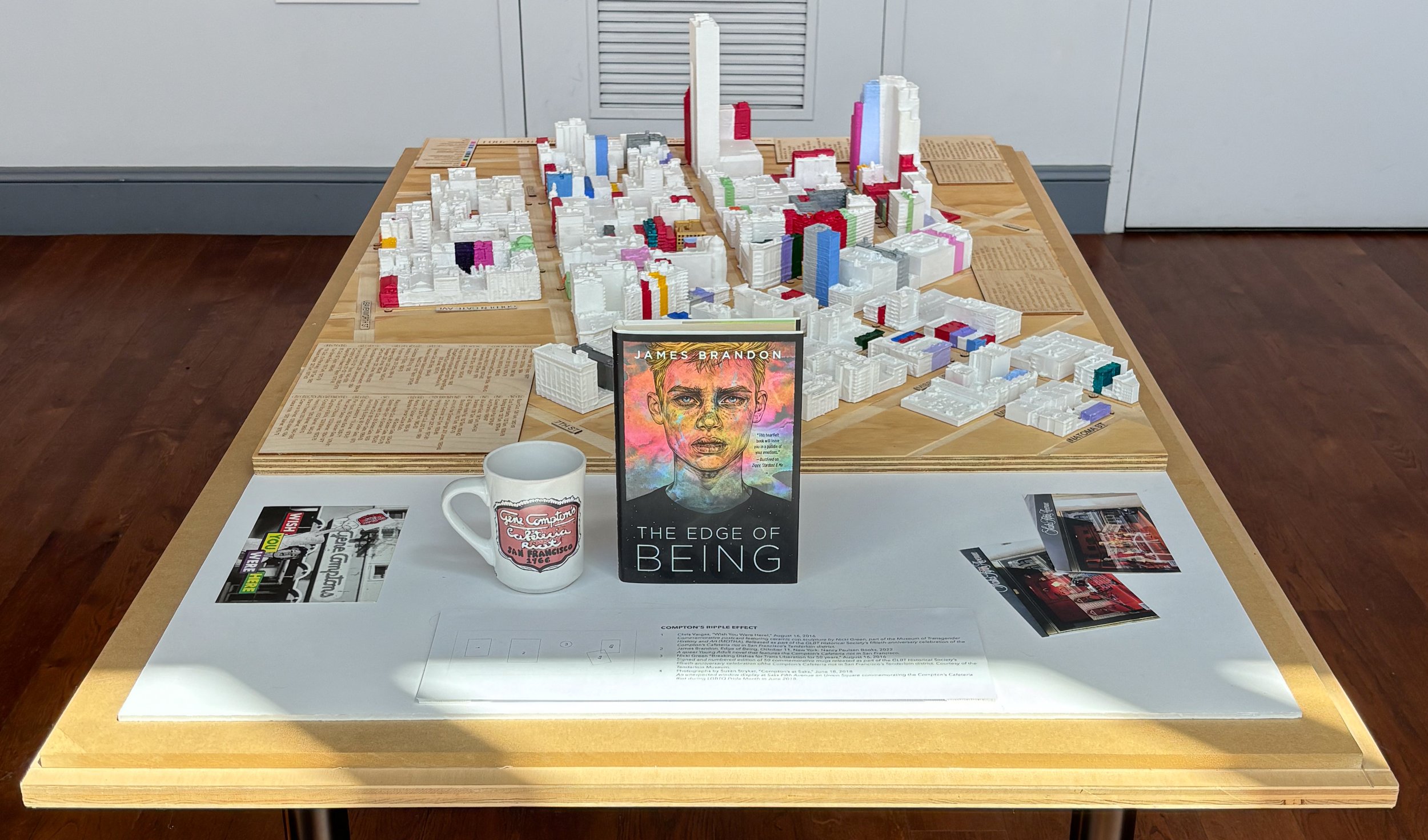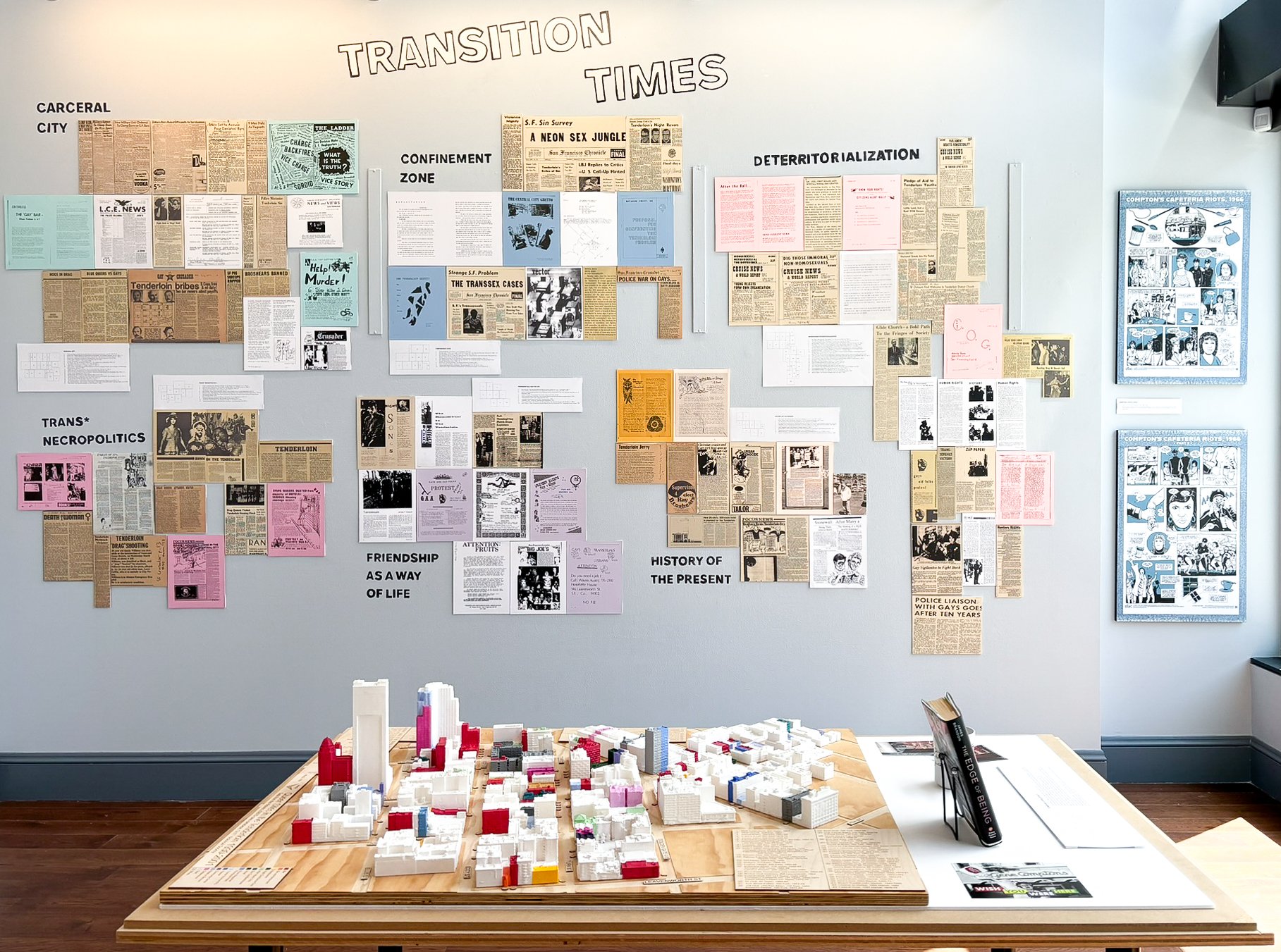Transition Times: Re-Membering Anticarceral Resistance in the Tenderloin
Co-curated by: Chandra Laborde and Stathis G. Yeros from the TurkxTaylor Initiative
On View: February 1st to April 26, 2024 EXTENDED June 8, 2024
Opening Reception & Informational Coalition Meeting on February 1, 2024 | 5:30-7:30pm
Closing Event: Trans Temporal Resistances on April 25, 2024 | 7-8:30pm
Utilizing historian Susan Stryker’s archive on the landmark site of the 1966 Compton’s Cafeteria riot on the corner of Turk and Taylor Streets, Transition Times: Re-Membering Anticarceral Resistance in the Tenderloin aims to highlight the building’s current use as a “halfway house” operated by private prison company GEO Group and to serve as a call to action to liberate this historical queer and trans site.
Transition Times: Re-Membering Anticarceral Resistance in the Tenderloin is an exhibit that contextualizes the story of the Compton’s Cafeteria riot, a queer grassroots uprising against police brutality in August 1966, as recovered by historian Susan Stryker. This exhibition shows selected material from the outstanding collection that Stryker has compiled since the 1990s, as the basis for her documentary Screaming Queens: The Riot at Compton’s Cafeteria, which provides the evidence to write a new and urgent chapter in an emerging history. In her more recent work titled “At the Crossroads of Turk and Taylor: Resisting carceral power in San Francisco’s Tenderloin District,” Stryker reveals how the same carceral power present during the riot remains oppressive in the historical building since it is now owned by a private prison company called GEO Group and operated as a “halfway house.”
In addition to a selection of Stryker’s archival collection, the exhibition examines the urban space around the riot’s site through a physical model identifying historical queer sites in the Tenderloin’s urban landscape. Additionally, the exhibition is further complemented with a series of ephemera and art pieces that demonstrate the riot’s ripple effect in the present. These elements show, through our own lenses, what a transformation toward liberation can mean in the context of place, people, and the preservation of a historian’s powerful archive and diligent research.
Photo by Emji Saint Spero
The exhibition’s title references performance artist Julian Carter’s article “Embracing Transition, or Dancing in the Folds of Time,” in which he explains how gender transition as an embodied experience is related to the technical vocabulary in dance when referring to transitional movements in spacetime. Transitions, as physical strategies, join time and space in ways that consider an embodied relationality that involves movement and change. Transitional time relates to the way queer temporality opposes normative time, folding back towards the past body that no longer exists while propelling society forward toward an embodied future. As we re-member Compton's Cafeteria riot as a pivotal time of anticarceral resistance in the Tenderloin, we perceive the present as another transitional time toward liberation and justice.
Our main objective is to illuminate the site’s historical significance and to share its current condition with broader audiences. In doing so, we aim to build a robust coalition comprised of organizations and individuals to imagine an alternative future for the building, one that honors its unique historical significance as the site of a consequential act of mass resistance to police abuse of trans people and other marginalized, stigmatized groups in the Tenderloin. We seek to activate public memory of the riot’s legacy as a catalyst for building a campaign to change the use of the building, through which we can challenge overarching structures of social oppression and advocate for justice in the most profound and broadest sense possible.
This exhibition is the first installment of a two-part series. In this first part, we look at the historical significance of the site, inviting reflection and a deeper understanding of its past. The second part, hosted at CounterPulse from May 2nd to August 24th, shifts focus toward envisioning trans futures by exploring alternatives for what the building can be, connecting its rich past with visionary futures.
The TurkxTaylor Initiative is an open assemblage formed by autonomous individuals without traditional leadership. Our mission is to liberate the landmark building at 101-121 Taylor Street in the Tenderloin, the historic site of the Compton’s Cafeteria riot of 1966, currently owned and operated as a halfway house by the private prison company GEO Group. We are interested in physically and symbolically re-envisioning the legendary queer and trans site and ultimately creating a just future for the historic structure. We use a collaborative decision-making process to share power and responsibility based on mutual trust.
Join the Coalition: www.turkxtaylor.net
Related Public Programs:
Opening Reception & Informational Coalition Meeting on February 1, 2024 | 5:30-7:30pm
Join us for the opening reception at 5:30pm on February 1, 2024, followed by an informational coalition meeting from 6-7:30pm. The TurkxTaylor Initiative has been working towards the site’s decarceration by building a coalition to push toward different ways to make this happen. In this first Coalition Informational Meeting, we invited key panelists to share information on the past, present, and future of the building at Turk and Taylor. The goal is for those interested in the project to understand the layers of complexity regarding Tenderloin politics so that together we can strategize about any possible steps forward.
2/1/24 Coalition Meeting Panelists:
Dr. Susan Stryker, historian and filmmaker who recovered the history of Compton’s riot
Ms. Janetta Johnson, co-founder of the Transgender District and CEO of TGI Justice Project
Toshio Meronek, host of the Sad Francisco podcast and co-author of Miss Major Speaks
Moses Corrette, city planner and historian
Dean Preston, Supervisor of District 5, San Francisco Board of Supervisors
Moderated by Chandra Laborde and Stathis G. Yeros, of the TurkxTaylor Initiative
*All audience members are strongly advised to wear a mask at this program. TLM will provide a mask for free to all attendees. Panelists may be unmasked while speaking.*
Closing Program: Trans Temporal Resistances on April 25, 2024 | 7-8:30pm
This performance series, in collaboration with the TurkxTaylor Initiative, mirrors an open assemblage model. Emji Saint Spero and Leila Weefur invite writers and artists to deconstruct trans archives and architectures through textual and movement-based approaches. Situated within a district in which desire has historically been boundaried and confined, these performances engage Queer Time as an embodied strategy of resistance.
The first event invites three local writers, Tatiana Luboviski-Acosta, Mason J, and Rowan Powell, to take space at the Tenderloin Museum.
Photo by Helen Bronston
Exhibit Curators:
Chandra Laborde is a doctoral student in the History, Theory, and Society Program of the Architecture Department at the University of California, Berkeley. Her work focuses on the intersection of gender, ecology, and the built environment. She holds a Master’s of Science from the University of California, Berkeley; a Master’s in Advanced Architectural Design from the California College of the Arts in San Francisco; and a Bachelor’s in Architecture from the Universidad Nacional Autónoma de México in Mexico City. She has professional design experience with ecological architecture in Tijuana, Baja California, Mexico.
Stathis G. Yeros is an Assistant Professor of Architecture at the University of Florida’s College of Design, Construction, and Planning. He completed his PhD in Architectural History, Theory, and Society at the University of California, Berkeley. His work examines how space affects and is affected by struggles for social justice, focusing on queer and transgender cultures and politics. He has published articles and chapters on spaces of black and brown transgender activism, most recently focusing on the Southern United States and queer ecologies. His first book, Queering Urbanism: Insurgent Spaces in the Fight for Justice is forthcoming in April 2024.
Featured archive:
Susan Stryker is Professor Emerita of Gender and Women’s Studies at the University of Arizona. Since retiring as fulltime faculty she has been Presidential Fellow and Visiting Professor of Gender, Women’s, and Sexuality Studies at Yale University (2019-2020), Barbara Lee Distinguished Chair in Women’s Leadership, Mills College (2020-2022), and Marta Sutton Weeks External Faculty Fellow, Stanford University Humanities Institute, 2022-23. She is co-editor of the Duke University Press book series ASTERISK: gender, trans-, and all that comes after. She is the author of Transgender History: The Roots of Today’s Revolution (2008, 2017), co-editor of the muti-volume Transgender Studies Reader (2006, 2013, 2022), as well as co-director of the Emmy-winning documentary film Screaming Queens: The Riot at Compton’s Cafeteria (2005). She is currently working to complete a trade book, Changing Gender, under contract to Farrar Straus Giroux.
Performance Program Co-Curators:
Emji Saint Spero (they/them) is a transqueer writer, performer, and pervert living in Los Angeles. They are curious about the potential of creative intimacies to queer the familiar, mapping the boundaries of collective en-gagement through movement, documentation, personal ephemera, and collaborative performance. Saint Spero is co-founder of the Oakland-based small press Timeless, Infinite Light and co-developmental editor for We Both Laughed in Pleasure: The Selected Diaries of Lou Sullivan (Nightboat Books x Timeless Infinite Light, 2019). They are the author of disgust (Nomadic Press, 2021) and almost any shit will do (Timeless, Infinite Light, 2014), and have work featured in Trans History in 99 Objects (Hirmer Publishers, 2024). Saint Spero is the curator of Communicator Series, a language-curious queer and trans* performance series at Poetic Research Bureau, and is currently working on two poetry manuscripts, Exhaustion and A Retching.
Ig @homopathetic
Leila Weefur (He/They/She) is an artist, writer, and curator based in Oakland, CA. Through film & installation they examine the performative elements connected to systems of belonging, present in Black, queer, gender-variant life. An entanglement of beauty and horror evokes concepts of sensorial memory, architectural psychology, hyper surveillance, and the erotic.
Weefur has worked with local and national institutions including the ICASF, CCA’s Wattis Institute, McEvoy Foundation, Berkeley Art Museum and Pacific Film Archive, San Francisco Art Institute, Museum of the African Diaspora, The Kitchen, and Smack Mellon. Weefur’s writing has been published in SEEN by BlackStar Productions, Sming Sming Books, Baest Journal, and more. Weefur is a lecturer at Stanford University and a member of The Black Aesthetic.
Ig @spikeleila






